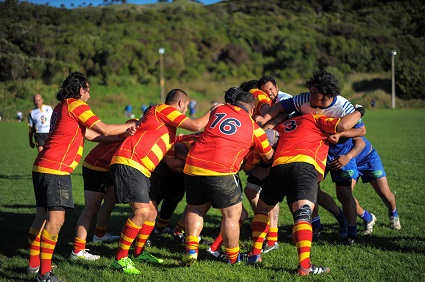- Rugby Toolbox
- Resources & Education
- Learn more
- "Games Based" Approach
- Games Based reading
- Using Game Sense to Coach Your Team
Using Game Sense to Coach Your Team

It is not a commonly used approach as it places the emphasis on players making decisions rather than the coach telling them how and why to do something, takes time, a coach who understands the game, has good questioning techniques and can recognise technical and tactical detail while on the run.
It is worth a try as it will increase the motivation of players as they are challenged to think about what they are doing and why.
Step 1: Play a Game. The players must have a clear understanding (model) of what the game is about with the coach creating situations where players have to find solutions for themselves.
This will assist in developing communication skills, leadership and teamwork, all aspects that are often neglected under the technique centred coaching model.
Step 2: Tactical Feedback. The coach has been observing and will halt the game at an appropriate time. His questioning and the discussion with the players will promote long term learning as the players discover things for themselves.
Step 3: Skills Feedback: Continue with the game. At an appropriate time discuss both the tactical and skill aspects of the game.
This method has a number of advantages: makes training enjoyable / creates positive interaction between players and coaches / develops tactical awareness / promotes being part of the team / enhances players understanding of the laws / creates a greater self-awareness. / a joint approach to the game is encouraged.
A key aspect is creating the modified game. This often needs to have an exaggerated emphasis to a particular tactical aspect.
To develop your own games consider some of the following questions:
- What tactics and skills do you want to develop within the game?
- What modifications can you make to emphasise the above?

- What will be the main challenge or problem for the players to solve?
- What are the boundaries and safety rules?
- What are some key questions you can ask?
- What progressions can you make to: increase the complexity? / vary the risk? / increase the pressure?
Consider some of the following modifications:
- Dimensions of the playing area.
- Positioning of the area that can be scored in.
- Number of passes allowed.
- Banning/promoting kicking.
- Number of players in attack and defence.
- Risk – deducting points for intercepted & dropped balls.
- Time – how long for the game. The time in the game.
- Specific roles for players.
Let the game be played uninterrupted as long as possible. This gives the players the opportunity to settle in to the game and gives you a chance to observe the players.
Ensure players understand the outcome you want them to achieve.
Questions to consider.
- Deception: 'How can you make your opponent go ….?’
- Risk: 'Is the long pass worth the risk?’
- Time: 'How can you create more time?’
- Space: 'Where is the space going to be?’
- Stage of the Game: 'You are two points down with two minutes to go. What is the play?’
- Decision making: 'Should you go for the intercept or cover the outside player?’
- Anticipation: 'What is your opponent likely response to this?
- Defensive pattern: 'should you have come in?’
- Minimising the attack: 'How can you reduce the options?’
- Scoring: 'Should you attack here or there?’
- Keeping possession: ' What would have been the best option?'
Games don't have to take up all of the training but they need to complement what you are already doing. Give it a go!